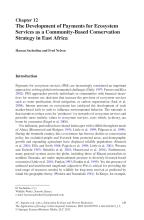Land Library Search
Through our robust search engine, you can search for any item of the over 73,000 highly curated resources in the Land Library.
If you would like to find an overview of what is possible, feel free to peruse the Search Guide.
/ library resources
Showing items 1 through 9 of 13.In this publication two pioneering grassroots organisations from northern Tanzania examine and present their experiences and insights from their long-term work to secure the land rights of hunter-gatherer and pastoral communities.
This paper explores the development of a pilot PES scheme in the Tarangire ecosystem of Tanzania in response to specifi c wildlife declines and policy constraints. It charts the development of this initiative from its genesis based on PES experiences in Kenya.
THE NEW LAND ACTS Pursuant to the Constitution of Kenya, three Acts of Parliament have been enacted and came into force on 2nd May, 2012: Land Act, 2012 Land Registration Act, 2012 National Land Commission Act, 2012 THE REPEALED ACTS The following Acts have been repealed: The Indian Trans
COUNTY GOVERNMENTS ACT NO. 17 OF 2012
Date of assent: 24th July, 2012.
Date of commencement: See Section 1.
Like many of its neighbors, Tanzania is experiencing a well-documented surge of land grabbing related to investments in industries such as agriculture, biofuels, tourism, hunting, and forestry.
This report provides a synthesis of three country level case studies (Namibia, Senegal, Kenya) carried out in African countries as a part of the overall legal review of Indigenous People’s and Community Conserved Territories and Areas (ICCAs).
Across the world, areas with high or important biodiversity are often located within Indigenous peoples’ and local communities’ conserved territories and areas (ICCAs).
The acquisition of land by foreigners in developing countries has emerged as a key mechanism for foreign direct investment (FDI).
In Kenya, insecure land tenure and inequitable access to land and natural resources have contributed to conflict and violence, which has in return exacerbated food insecurity. Most farmers in Kenya have no legal title for the land on which they farm.









